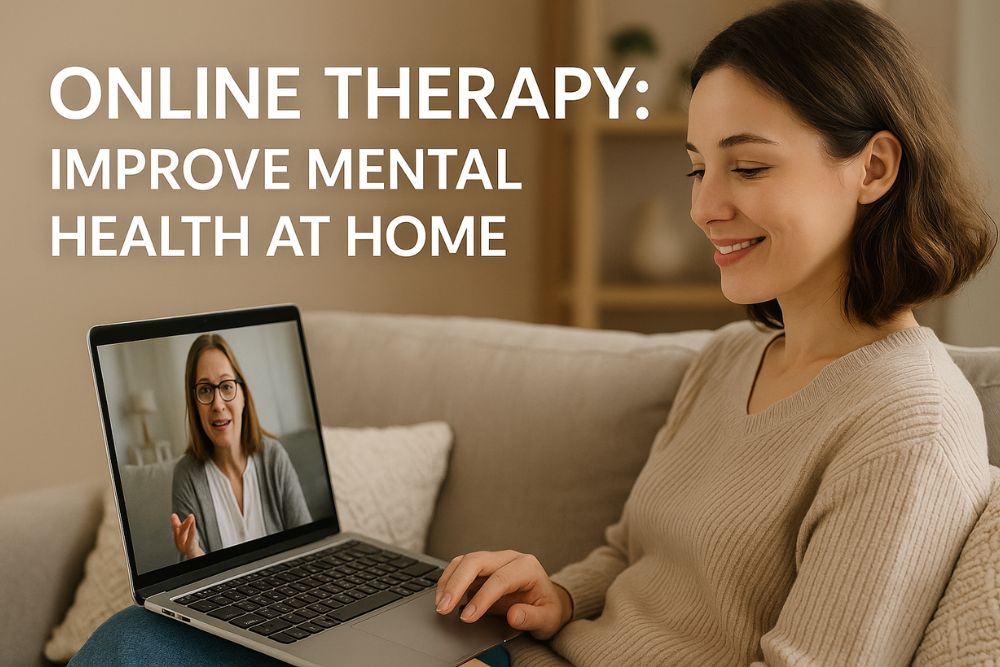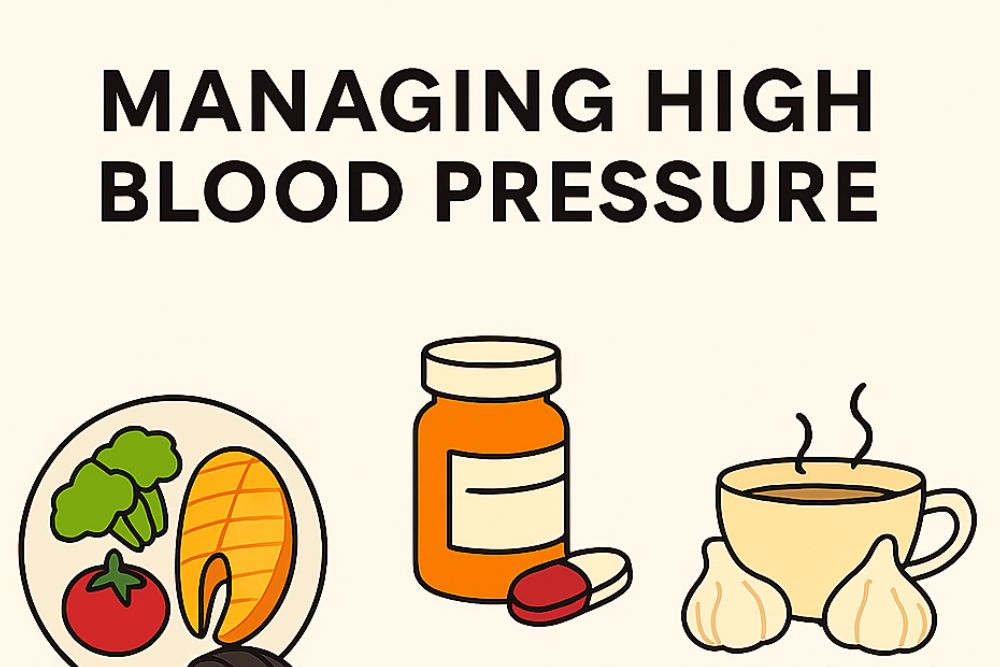Online Therapy: Explore Mental Health Help Right From Home
Caleb Martin
2025-11-12
6 min read

In recent years, online therapy has seen a surge in popularity, offering a convenient way to access mental health support without leaving the comfort of home. Tons of new programs have popped up with educated and licensed therapists just a click away. This innovative approach is changing the way people seek help, making therapy more accessible, flexible, and affordable. For those navigating life's challenges or simply looking to improve their well-being, online therapy can be an excellent solution.
Curious about whether online therapy is the right choice:
Key Benefits of Online Therapy
One of the main advantages of online therapy is its accessibility. Whether residing in a rural area with limited mental health resources or managing a hectic schedule, therapy can be accessed from any location. Sessions can be conducted over video calls, phone calls, or even messaging platforms, allowing individuals to choose a method that best suits their comfort level.
In addition to accessibility, online therapy offers a high degree of privacy. There's no need to travel to a clinic or sit in a waiting room. For those who value discretion, this can be a significant benefit. The flexibility to schedule appointments around other commitments also makes online therapy appealing to busy professionals, parents, and students.
Leading Platforms Offering Professional Support
There are several reputable platforms that provide professional online therapy services. Two of the most popular options include:
- Talkspace: Known for its flexibility, Talkspace connects users with licensed therapists through a range of communication methods, including video, audio, and text messaging. It is designed to accommodate various mental health needs, including anxiety, depression, and relationship issues.
- BetterHelp: As one of the largest online therapy platforms, BetterHelp offers access to licensed counselors who specialize in a wide range of concerns. This platform is ideal for those looking to work on personal growth, emotional well-being, or coping strategies.
Both platforms make it easy to match with a therapist based on personal preferences and mental health goals. Additionally, users can switch therapists if needed, ensuring a good fit for ongoing support.
How to Choose the Right Online Therapist
Finding the right therapist is a crucial step in making the most of online therapy. With so many options available, it’s essential to take the time to choose a therapist who aligns with personal needs and preferences. Here are some tips to help narrow down the selection:
1. Define Your Goals
Before starting therapy, it’s helpful to have a clear understanding of what to achieve. Are you looking for help with managing anxiety, improving self-esteem, navigating relationship issues, or simply seeking a safe space to express feelings? Knowing the specific areas of focus can help identify therapists who specialize in those areas.
2. Check Credentials & Licensing
Ensure that any therapist considered is fully licensed and accredited. Platforms like Talkspace and BetterHelp screen their therapists, but it’s always a good idea to review a therapist’s credentials independently. Look for qualifications like Licensed Professional Counselor (LPC), Licensed Clinical Social Worker (LCSW), or Clinical Psychologist (Ph.D. or Psy.D.).
3. Consider Therapeutic Approaches
Different therapists use varying approaches, such as Cognitive Behavioral Therapy (CBT), Psychodynamic Therapy, or Mindfulness-Based Stress Reduction (MBSR). If there's a preference for a specific therapeutic style or past success with a particular approach, search for a therapist trained in that method.
4. Prioritize Communication Style
Comfort and rapport with a therapist are essential for effective therapy. Some therapists are more direct, while others take a gentler, listening-oriented approach. Consider scheduling a preliminary session or consultation to gauge whether the therapist’s communication style is a good fit.
5. Read Reviews & Testimonials
Most reputable online therapy platforms allow users to leave reviews. While reviews should be taken with caution, they can provide insights into a therapist’s approach, responsiveness, and effectiveness. Reading about others’ experiences can help set realistic expectations.
6. Evaluate Scheduling & Availability
One of the major benefits of online therapy is flexibility, but it’s still crucial to find a therapist whose availability aligns with your schedule. Check whether they offer evening or weekend appointments if needed, and ensure their response time meets your expectations if opting for text or email-based sessions.
7. Understand Costs & Payment Options
While online therapy is often more affordable than traditional in-person sessions, costs can vary. Be sure to check whether insurance is accepted or if there are sliding scale options available. Some platforms offer subscription packages, which can be more cost-effective for those needing regular sessions.
8. Trust Your Instincts
Finally, trust personal instincts when selecting a therapist. It’s perfectly okay to change therapists if the first one doesn’t feel like a good fit. The goal is to find a professional who feels supportive, non-judgmental, and capable of guiding you through your mental health journey.
Types of Therapies Offered Online
Online therapy covers various types of counseling, including:
- Cognitive Behavioral Therapy (CBT): Often used to address anxiety, depression, and negative thought patterns.
- Dialectical Behavior Therapy (DBT): Focuses on emotional regulation and coping mechanisms, particularly for those dealing with stress or trauma.
- Couples Therapy: Helps partners improve communication and resolve conflicts, even from a distance.
- Grief Counseling: Provides support for those coping with loss or significant life changes.
These therapies are conducted by licensed professionals, ensuring the same quality of care as in-person sessions.
Who Can Benefit from Online Therapy?
Online therapy is well-suited for individuals facing various challenges, including:
- Anxiety & Stress: For those looking to manage overwhelming feelings or panic attacks.
- Relationship Issues: Couples can work through conflicts and communication barriers.
- Depression: Provides support for those struggling with low mood, motivation, or negative thinking.
- Lifestyle Adjustments: Offers guidance for managing big life changes, such as moving to a new city or starting a new job.
However, it may not be suitable for those experiencing severe mental health crises or in need of immediate intervention.
Pros and Cons of Online Therapy
Advantages:
- Convenience: Schedule sessions without the hassle of commuting.
- Flexibility: Options for video, phone, or text-based sessions.
- Privacy: Confidential support from the comfort of home.
Limitations:
- Tech Dependence: Requires a stable internet connection and a comfortable familiarity with digital platforms.
- Lack of Physical Presence: For some, the absence of in-person interaction can feel less personal.
- Suitability: Not ideal for those in crisis or needing intensive support.
Understanding the Costs of Online Therapy
Online therapy can be a cost-effective alternative to traditional in-person sessions. The cost varies depending on the platform and the type of services offered. Many platforms offer subscription models with weekly or monthly billing, which can range from around $50 to $200 per session. Compared to traditional therapy, which can often cost significantly more, online options may provide a more budget-friendly solution for ongoing support.
Conclusion
Online therapy is transforming the way individuals access mental health services, offering flexibility, convenience, and professional support. With various platforms to choose from, such as Talkspace and BetterHelp, therapy is now more accessible than ever. However, it’s essential to carefully consider personal needs, preferences, and budget when choosing a platform or therapist.
Sources:
- American Psychological Association (APA)
- National Institute of Mental Health (NIMH)
- Talkspace Official Website
- BetterHelp Official Website
More Trending Articles

Understanding Atrial Fibrillation: Effective Treatments and Tips for Management
Bryson Jenkins
2025-11-17

